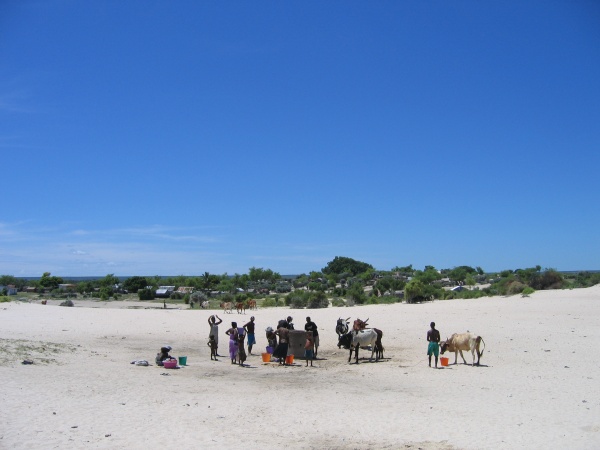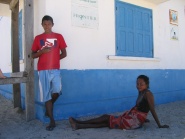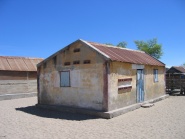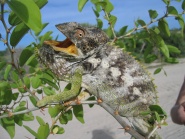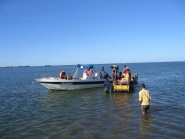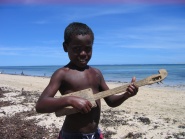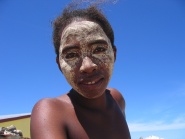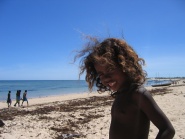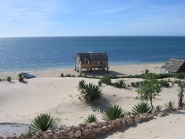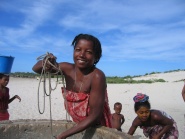Difference between revisions of "Anakao"
| Line 1: | Line 1: | ||
| − | '''Anakao is a small beautiful fishing village stretching over a long beach located about 40 kilometres south of [[Tulear]]. With the exception of a fairly small number of visiting tourist, the relative isolation of this village has helped | + | '''Anakao is a small beautiful fishing village stretching over a long beach located about 40 kilometres south of [[Tulear]]. With the exception of a fairly small number of visiting tourist, the relative isolation of this village has helped preserve a traditional way of life amongst its estimated 3,000 inhabitants; one of the highest concentrations of [[Vezo]] people living along the coastline of Madagascar.''' |
[[File:Water hole Anakao.jpg|thumb|left|600px|Communal water well at Anakao village]]<br clear="all"> | [[File:Water hole Anakao.jpg|thumb|left|600px|Communal water well at Anakao village]]<br clear="all"> | ||
| − | Due to poor road conditions, the village is best reached by boat from Tulear, which usually takes about one hour. During low tide, the transfer begins with a short oxcart ride onto the seabed to reach a pirogue or motorboat. | + | Due to poor road conditions, the village is best reached by boat from Tulear, which usually takes about one hour. During low tide, the transfer begins with a short oxcart ride onto the seabed to reach a pirogue or motorboat. Various hotels in Anakao provide transfers that can be booked in Tulear harbour directly from where the boats depart. |
| − | + | There are a few basic hotels strewn along the coastline of Anakao and past both ends of the village. These are typically simple beach huts, providing an idyllic life-on-beach experience to visiting tourists. In the early morning countless pirogues can be seen leaving in the direction of the open ocean for fishing until returning in the afternoon in clusters of small sailing regattas. | |
<table cellpadding="0" cellspacing="0" border="0" style="margin-right:10px;"><tr> | <table cellpadding="0" cellspacing="0" border="0" style="margin-right:10px;"><tr> | ||
| Line 12: | Line 12: | ||
<td valign="top">[[Image:Anakao_00040.jpg|185px|none|thumb|Unidentified chameleon]]</td></tr></table> | <td valign="top">[[Image:Anakao_00040.jpg|185px|none|thumb|Unidentified chameleon]]</td></tr></table> | ||
| − | + | Some very large and ancient tombs can be found behind the village and depending on the profession of the buried they are usually decorated with oars or zebu horns. South of the village fragments of eggshells from the world's largest bird, the now extinct [[Aepyornis]] or elephant bird, can be found scattered along the beach. It is illegal to bring these shell fragments out of the country. | |
<table cellpadding="0" cellspacing="0" border="0" style="margin-right:10px;"><tr> | <table cellpadding="0" cellspacing="0" border="0" style="margin-right:10px;"><tr> | ||
| Line 24: | Line 24: | ||
</tr></table> | </tr></table> | ||
| − | Two small nature protected islands, [[Nosy Ve]] and [[Nosy Satrana]], are located | + | Two small nature protected islands, [[Nosy Ve]] and [[Nosy Satrana]], are located shortly off the coast of Anakao. Both islands are uninhabited and offer no accommodation and can only be visited by day, usually by a fisherman pirogue from the village or via one of the hotels. |
<!--<googlemap version="0.9" lat="-23.659059" lon="43.646268" zoom="17" controls="large"> | <!--<googlemap version="0.9" lat="-23.659059" lon="43.646268" zoom="17" controls="large"> | ||
Revision as of 07:51, 20 April 2010
Anakao is a small beautiful fishing village stretching over a long beach located about 40 kilometres south of Tulear. With the exception of a fairly small number of visiting tourist, the relative isolation of this village has helped preserve a traditional way of life amongst its estimated 3,000 inhabitants; one of the highest concentrations of Vezo people living along the coastline of Madagascar.
Due to poor road conditions, the village is best reached by boat from Tulear, which usually takes about one hour. During low tide, the transfer begins with a short oxcart ride onto the seabed to reach a pirogue or motorboat. Various hotels in Anakao provide transfers that can be booked in Tulear harbour directly from where the boats depart.
There are a few basic hotels strewn along the coastline of Anakao and past both ends of the village. These are typically simple beach huts, providing an idyllic life-on-beach experience to visiting tourists. In the early morning countless pirogues can be seen leaving in the direction of the open ocean for fishing until returning in the afternoon in clusters of small sailing regattas.
Some very large and ancient tombs can be found behind the village and depending on the profession of the buried they are usually decorated with oars or zebu horns. South of the village fragments of eggshells from the world's largest bird, the now extinct Aepyornis or elephant bird, can be found scattered along the beach. It is illegal to bring these shell fragments out of the country.
Two small nature protected islands, Nosy Ve and Nosy Satrana, are located shortly off the coast of Anakao. Both islands are uninhabited and offer no accommodation and can only be visited by day, usually by a fisherman pirogue from the village or via one of the hotels.
Hotels and beach huts in Anakao
Prince Anakao (27 bungalows)
Tel: +261 94 43957
Email: anakao@simicro.mg
Website: www.prince-anakao.com
Bivouac Lalandaka/Chez Olivier (6 bungalows)
Tel: +260 (0)32 0434142 or +261 (0)32 0227520
Email: N/A
Safari Vezo (23 bungalows)
Tel: +261 (0)20 9441381 (Tulear) or +261 (0)32 0263887 (Anakao)
Email: safarivezo@netclub.mg
Anakao Club Resort (6 bungalows)
Tel: +261 (0)20 9491957 (Tulear) or +261 (0)32 0760257 (Anakao)
Email: mda@wanadoo.mg
Website: www.anakaoclubresort.com
Hotel La Reserve (6 bungalows)
Tel: +261 (0)32 0214155
Email: quad@dts.mg
Chez Solange & Christophe (3 rooms)
Tel: +261 (0)32 0418093
Email: lacombe-christian@voila.fr
Longo Veza (7 bungalows)
Tel: +261 (0)94 43764 or +261 (0)32 02631
Email: N/A
Lalandaka
Tel: +261 (0)20 9491435
Email: lalandaka@moov.mg
Trano Mena / Chez Stoick (6 bungalows)
Tel: +261 (0)32 0213426 or +261 (0)32 0265900
Email: N/A
Chez Emile (6 bungalows)
Tel: +261 (0)32 0402376
Email: emile@compagniedusud.com
